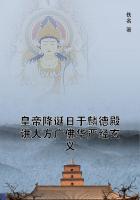She would often ask Mrs. Bentley to sit with her until bedtime, and revel in the shrewd north-country woman's experiences, and her impressions of the new land to which love had brought her. Both women grew to have a sincere and trustful affection for each other, and one night, seven or eight months after Mrs. Denison's death, Mrs. Bentley told a story which explained what had frequently puzzled Alice--the patient sorrow in Mrs. Denison's eyes, and Mr. Denison's harassed and dejected manner. "But for your goodness to the children," said the old woman, "and the way that precious baby takes to you, I don't think I should be willing to say what I am going to do, miss. Though my dear mistress wished it, and said, the very last night, 'You must tell her all about it, some day, Nana,'--and I promised, to quiet her,--I don't think I could bring myself to it if I hadn't lived with you and known you." And then the good nurse told her strange and moving tale.
She described how her master had come out young and careless-hearted to New Zealand in the service of the government, and how scandalised and angry his father and mother, the old Tory squire and his wife, had been to receive from him, after a year or two, letters brimming with a boyish love for his "beautiful Maori princess," whom he described as having "the sweetest heart and the loveliest eyes in the world." It gave them little comfort to hear that her father was one of the wealthiest Maoris in the island, and that, though but half civilised himself, he had had his daughter well educated in the "bishop's" and other English schools. To them she was a savage. There was no threat of disinheritance, for there was nothing for him to inherit. There was little money, and the estate was entailed on the elder brother. But all that could be done to intimidate him was done, and in vain. Then silence fell between the parents and the son.
But one spring day came the news of a grandson, called Benjamin after his grandfather, and an urgent letter from their boy himself, enclosing a prettily and humbly worded note from the new strange daughter, begging for an English nurse. She told them that she had now no father and no mother, for they had died before the baby came, and if she might love her husband's parents a little she would be glad.
"My lady read the letters to me herself," Mrs. Bentley said; "I'd taken the housekeeper's place a bit before, and she asked me to find her a sensible young woman. Well, I tried, but there wasn't a girl in the place that was fit to nurse Master Horace's child. And the end of it was, I came myself, for Master Horace had been like my own when he was a little lad. My lady pretended to be vexed with me, but the day I sailed she thanked me in words I never thought to hear from her, for she was a bit proud always." The faithful servant's voice trembled.
She leaned back in her chair, and forgot for the moment the new house and the new duties. She was back again in the old nursery with the fair-haired child playing about her knees. But Alice's face recalled her, and she continued the story. She had, she said, dreaded the meeting with her new mistress, and was prepared to find her "a sort of a heathen woman, who'd pull down Master Horace till he couldn't call himself a gentleman."
But when she saw the graceful creature who received her with gentle words and gestures of kindliness, and when she found her young master not only content, but happy, and when she took in her arms the laughing healthy baby, she felt--though she regretted its dark eyes and hair--more at home than she could have believed possible. The nurseries were so large and comfortable, and so much consideration was shown to her, that she confessed, "I should have been more ungrateful than a cat if I hadn't settled comfortable."
Then came nearly five happy years, during which time her young mistress had found a warm and secure place in the good Yorkshire heart. "She was that loving and that kind that **** Burdas, the groom, used to say that he believed she was an angel as had took up with them dark folks, to show 'em what an angel was like." Mrs. Bentley went on:
"She wasn't always quite happy, and I wondered what brought the shadow into her face, and why she would at times sigh that deep that I could have cried. After a bit I knew what it was. It was the Maori in her.
She told me one night that she was a wicked woman, and ought never to have married Master Horace, for she got tired sometimes of the English house and its ways, and longed for her father's /whare/; (that's a native hut, miss). She grieved something awful one day when she had been to see old Tim, the Maori who lives behind the stables. She called herself a bad and ungrateful woman, and thought there must be some evil spirit in her tempting her into the old ways, because, when she saw Tim eating, and you know what bad stuff they eat, she had fair longed to join him. She gave me a fright I didn't get over for nigh a week. She leaned her bonny head against my knee, and I stroked her cheek and hummed some silly nursery tune,--for she was all of a tremble and like a child,--and she fell asleep just where she was."
"Poor thing!" said Alice, softly.
"Eh, but it's what's coming that upsets me, ma'am. Eh, what suffering for my pretty lamb, and her that wouldn't have hurt a worm! Baby would be about six months old when she came in one day with him in her arms, and they /were/ a picture. His little hand was fast in her hair. She always walked as if she'd wheels on her feet, that gliding and graceful. She had on a sort of sheeny yellow silk, and her cheeks were like them damask roses at home, and her eyes fair shone like stars.















